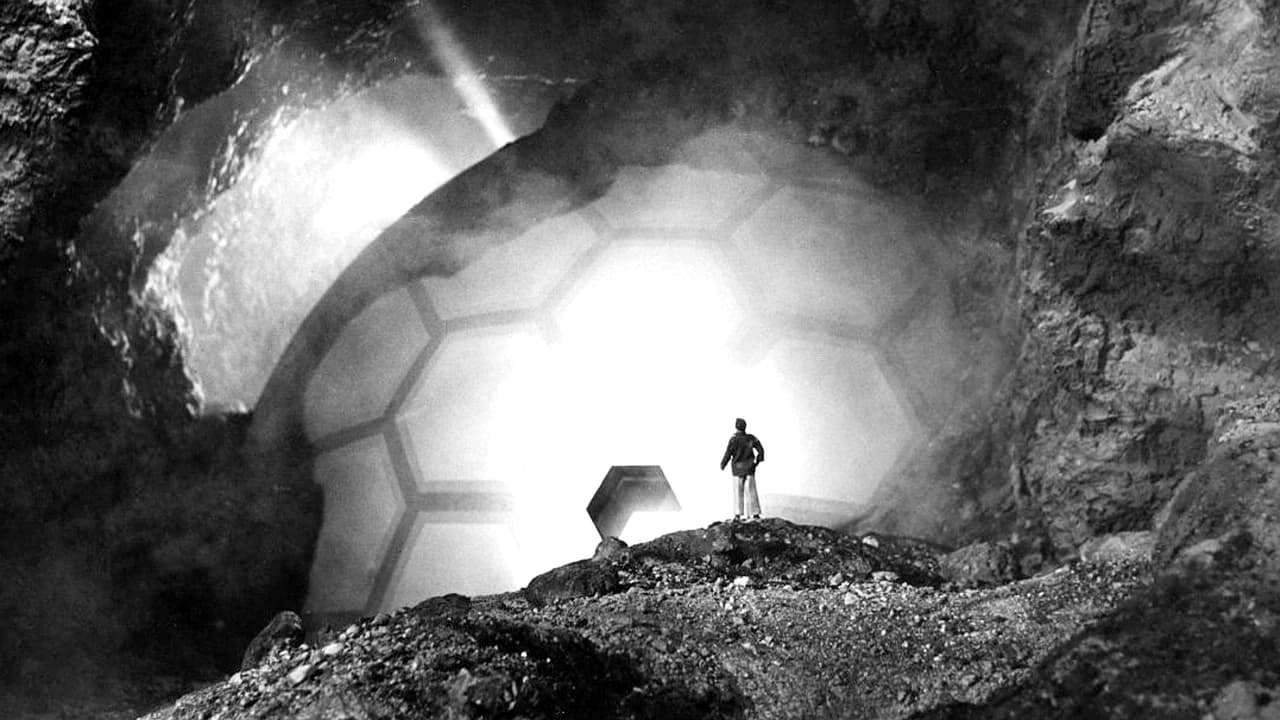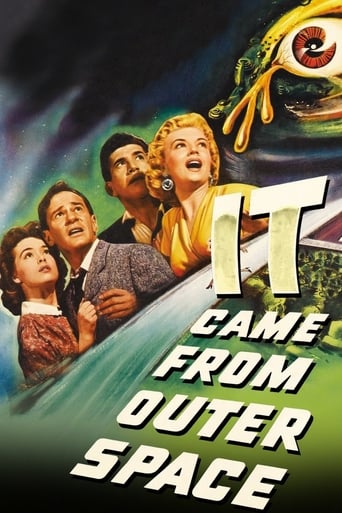Steinesongo
Too many fans seem to be blown away
Freaktana
A Major Disappointment
ChicDragon
It's a mild crowd pleaser for people who are exhausted by blockbusters.
Motompa
Go in cold, and you're likely to emerge with your blood boiling. This has to be seen to be believed.
Blueghost
There's something about scifi pre-1970s. It doesn't condescend. It doesn't have children exclusively in mind. and in that vein it doesn't treat the audience like high school drop outs by trying to keep both plot and story simple.So it is with "It Came from Outer Space". It's not loaded with CGI, there's no rapid cutting, there's no obnoxious overly loud music, there's little gunplay, and the the emphasis is on the story and characters and not the action.That's not to say that there isn't any action, because there is, but it doesn't overshadow the core of the film; the story. And typical with pre 1970's science fiction, it's not an overly smart film in spite of some good clever story writing with a fairly profound message.On top of that the shooting style is basic. There's one aerial shot that's fairly basic, but, given the time, there's obviously no steadicam nor likewise other camera gymnastics so common with today's scifi-action films. One doesn't want to downplay nor criticize too much modern films, but there is an elegance and simplicity of "It Came from Outer Space" that one doesn't see anymore. And for a black and white film seeing it on bluray with all of the photgraphic detail really makes up for the limits of the technology of the time. Spielberg is said that his Close Encounter's film is essentially this film, but with a bit more of an upbeat ending. I think I can safely say that as remakes go, Close Encounters does this film justice, and this film is a proud father to Spielberg's "son", so to speak.A bit slower than today's scifi offerings, somewhat cliché in terms of the musical presentation along with some of the presentation of the alien visitors, it's still a solid movie.See it if you're in the mood for some classic science fiction from the 50s.Enjoy.
gavin6942
A spaceship from another world crashes in the Arizona desert, and only an amateur stargazer and a schoolteacher suspect alien influence when the local townsfolk begin to act strange.The screenplay by Harry Essex, with input by Jack Arnold, was derived from an original screen treatment by Ray Bradbury; screen legend says Bradbury wrote the original screenplay and Harry Essex merely changed the dialogue and took the credit. Unusual among science fiction films of the era, the alien "invaders" were portrayed by Bradbury as creatures without malicious intent toward humanity.No doubt helped by Bradbury's script, this is a strong outing in the career of Jack Arnold, who made many memorable (but cheesy) science fiction films. This one seems more serious, more intelligent, and even the alien (when finally shown) looks excellent by 1950s standards.
PimpinAinttEasy
Beautiful long shots of barren desserts. And of cars going down empty American highways. Barbara Rush was easy on the eyes. Richard Carlson was sort of an all American leading man. He plays the only sane person in a small desert town which intensely fears the space ship that has landed in the desert.The bubble like creatures from the space ship were good enough for the time this film was made, I guess.Like other sci-fi movies of the time (eg. The Day the Earth Stood Still in 1951) the film portrays base human instincts as negative and violent. Even the background score is quite similar to The Day the Earth Stood Still. The movie is based on a story by Ray Bradbury.(6/10)
Scarecrow-88
That old adage of "we kill what we don't understand" can be applied to It Came from Outer Space, another solid classic bit of sci-fi B-movie from director Jack Arnold, with a screenplay inspired by Bradbury's The Meteor. Supposedly a meteor lands in the Arizona desert near a small town, but in fact it is a space ship carrying an alien race quite repulsive to humans. With a smart script that questions our inability to wait before pulling out our guns and firing, and telling us that the aliens aren't always a threat to humankind, It Came from Outer Space tried to provoke our thoughts away from believing that those from outside our world land here to hurt us. Richard Carlson is kind of a B-movie icon for many of us, mainly due to his association with Creature from the Black Lagoon and this film. He is the lone scientist (a "star gazer" in this film, considered by the papers who mock his claim that it was a space ship that landed in the desert, not a meteor as suspected) who tries to speak for the aliens, hoping to convince the sheriff (Charles Drake) that using guns won't solve anything except perhaps hurt those "taken captive" by them in order to use their likenesses in town to secure hardware needed to fix their vessel (and produce a weapon to protect themselves). With Barbara Rush as Carlson's love interest (and eventually kidnapped herself, naturally), and Russell Johnson (of Gilligan's Island fame) as the employee of an electrician (Joe Sawyer) in the cast, this is actually a respected sci-fi film, not relegated to the cheesy conversation of many of its ilk. There are some imaginative first-person perspective shots "seen through the eye" of the alien as it descends upon and spy on humans. The special effects aren't the bright spot of this one: its budget is obviously low as the alien is a rubbery monstrosity that could have been made by Paul Blaisdell, and the ship is basically a ball (probably inflatable). I always find myself engaged in the presentation, though, as it has that Invasion of Body Snatchers meets Day the Earth Stood Still feel to it. Carlson was always reliable and interesting, and he conveys the frustrations/dismay of being dismissed for his claims of the spaceship/alien presence, conflicted, agonizing anxiety at if he should believe in what the race of aliens are telling him regarding peaceful non-threatening motives on earth (just repairs and accidental crash on the planet, not willing to confront the earthlings due to our "shoot first, ask later" response to beings unlike us), and struggle to maintain a posse led by the sheriff when it appears the townsfolk are being kidnapped and possibly in harm's way. The setting in Arizona (actually shot in California) is quite refreshing (THEM also has that, as does Arnold's own Tarantula), and it is used expansively. One good scene I like has Joe's electrician listening to "strange noise" through the power lines with Carlson getting an ear of it, commenting on how the desert has its own voice. The Joshua tree even gets a good bit of ooga-booga use as Rush screams when it is shadowed in darkness, as she believes it is the alien. The zombie-like movements of alien clones of the human locals is quite pod-like, and the simple small town rural sense of place within the enveloping desert landscape does create a bit of "perfect cover" for aliens needing to get their ship in order…or else. The reliable scores of these kinds of 50s sci-fi shows itself effectively here in this film as well.

